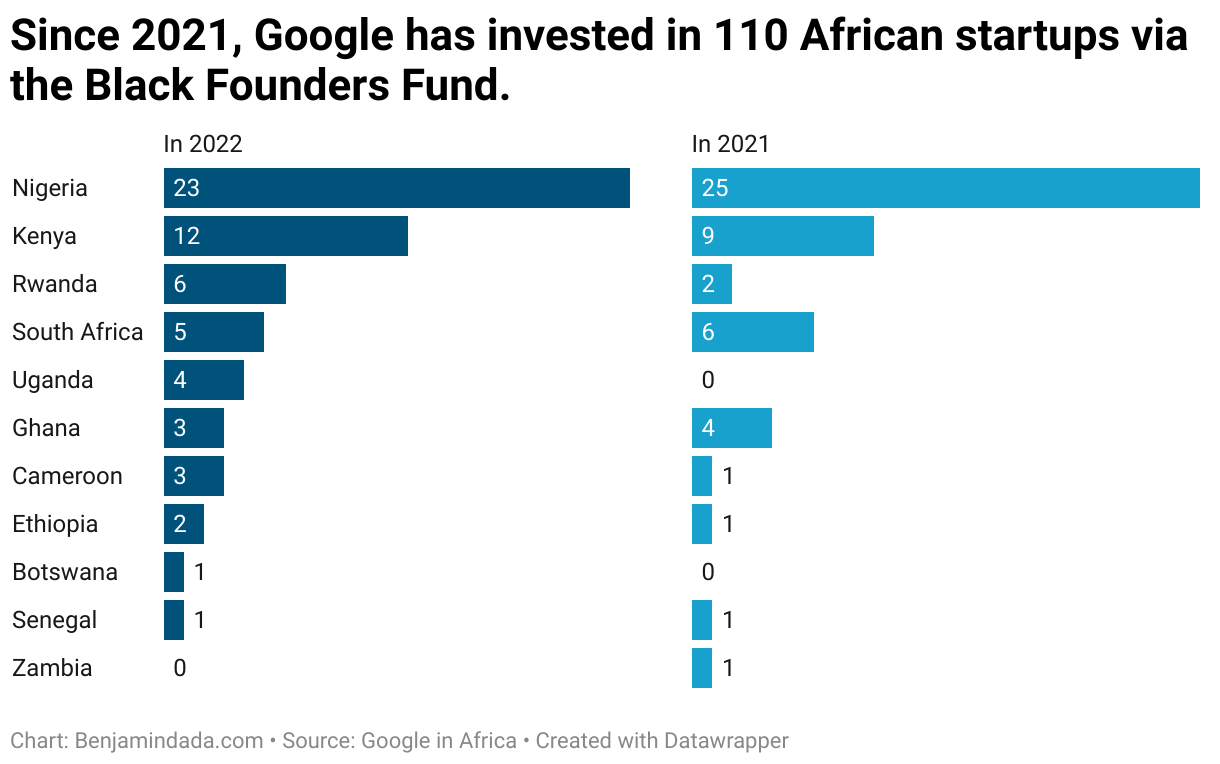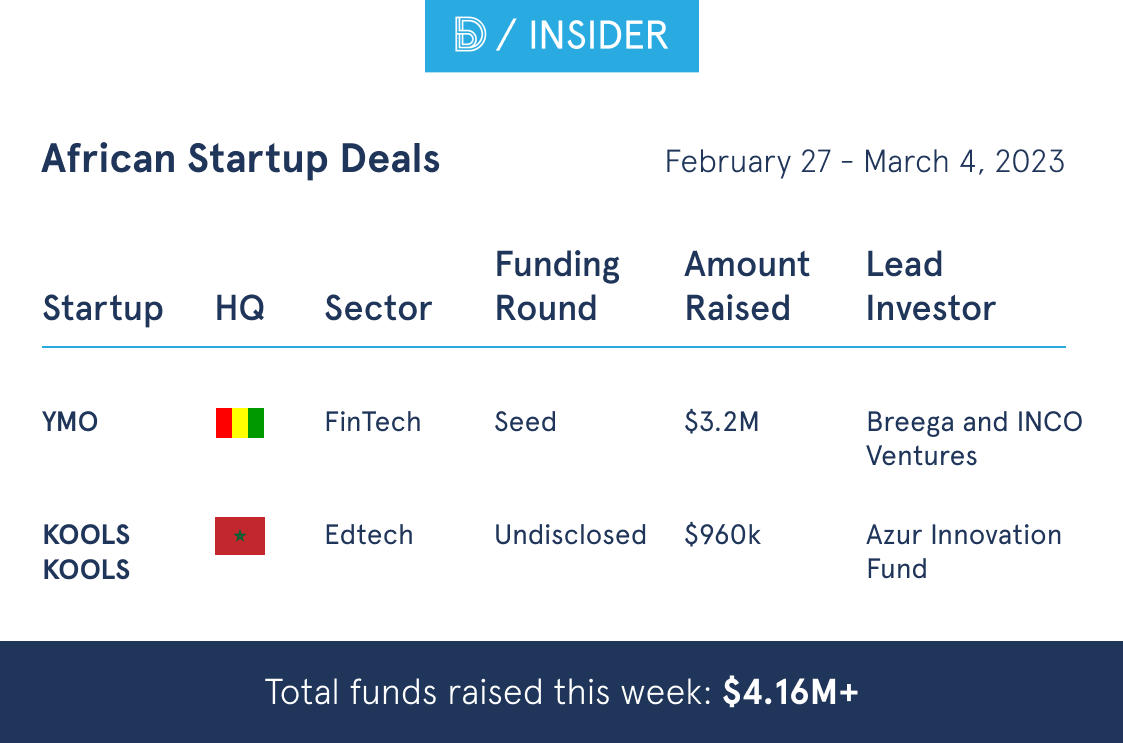BD Insider: A timeline of Nigeria's 2023 demonetisation policy
Letter 152 examines Nigeria's 2023 demonetisation policy, MFS Africa's plan for cross-border mobile money transfers in Africa and Namibia's residence by investment program.

On Sunday, several media reports said that hackers robbed Flutterwave of over ₦2.9 billion ($6.3 million). According to Techpoint Africa, ₦2,949,557,867 was illegally transferred from the account of the Nigerian fintech company.
Amidst these claims, Yewande Akomolafe-Kalu, Head of Branding and Storytelling at Flutterwave, said, "Flutterwave has not been hacked". However, she noted that a merchant's account was compromised but "...no user lost any funds."
In letter 152, we examine:
- the timeline of the ongoing demonetisation in Nigeria
- MFS Africa's plan for cross-border mobile money transfers in Africa
- the launch of the "residence by investment" program in Namibia
and other noteworthy information like:
- the latest African Tech Startup Deals
- opportunities, interesting reads and more
The big three!
How Nigeria's 2023 demonetisation policy is going
Last week, Nigeria's Supreme Court halted the ongoing demonetisation process until December 2023. According to the court ruling, the old ₦200, ₦500 and ₦1000 notes are still legal tender.
At the time of this report, the Central Bank of Nigeria (CBN) is yet to comment on the ruling. However, a few weeks ago, Nigeria's President, Muhammadu Buhari approved the use of old ₦200 notes only as legal tender until April 10, 2023. This approval has not solved the issue of cash shortage in the country.
Let's take a look at how it started and where we are now.
CBN announced the issuance of new Naira notes which will be circulated from December 15, 2022, stating that the old Naira notes will not be regarded as legal tender by January 31, 2023.
Nigeria's finance ministry kicked against the currency redesign, stating that the finance ministry was not consulted over the monetary policy.
Jan. 21, 2023:
CBN launched a cash swap programme across the country following the unavailability of the new notes.
Jan. 24, 2023:
The National Assembly asked the CBN to extend the deadline to accept the old naira notes.
Jan. 25, 2023:
During a campaign, Nigeria's president-elect Bola Tinubu claimed that the Naira redesign policy was designed to ensure his defeat.
Jan. 29, 2023:
CBN governor, Godwin Emefiele issued a 10-day extension of the deadline for the deposit of old banknotes and the validity of the old notes, following a meeting with President Buhari.
Feb. 3, 2023:
Three states in Northern Nigeria–Kaduna, Kogi and Zamfara—sued the federal government, seeking the Supreme Court's order to halt the implementation of the naira redesign policy.
Feb. 6, 2023:
A Federal High Court sitting in Abuja ordered the CBN to ensure the enforcement of the February 10 deadline for the old currency notes. The four parties in their ex parte request alleged that the CBN's new monetary policy was being sabotaged by Nigerian banks.
Feb. 8, 2023:
Nigeria's Supreme Court ordered the CBN not to end the use of old naira notes on February 10, following the lawsuit filed by the three Northern states.
Feb. 10, 2023:
The CBN maintained that the old Naira notes are no longer legal tender.
Feb. 16, 2023:
Nigeria's President, Muhammadu Buhari approved the use of old ₦200 notes as legal tender until April 10 2023.
March 3, 2023:
Supreme Court says old Naira notes remain legal tender till December 2023.
Since the introduction of the new Naira notes, its unavailability has led to a nationwide cash shortage affecting the nation's economy. It has also led to protests and vandalisation of banks' physical assets because of the unsatisfied customer queues inside banking halls and at ATMs across the country looking for new notes.
In fact, CICO agents now charge 10x the fee for cash withdrawals, and they also do not receive old notes for deposits, as observed in Jos, North Central Nigeria.
On the other hand, the pivot to a cashless economy, which is CBN's desire, has also been ineffective due to poor network and internet banking infrastructure.
MFS Africa to enable cross-border mobile money transfers in Africa
The news: MFS Africa has partnered with Western Union to enable individuals and businesses across the continent to receive money from over 200 countries and territories.
The partnership will enable funds to be sent from countries around the world to mobile wallets across Africa through the organisation's licensed payment rails. The service will first launch in Madagascar, and eventually in other countries across the continent.
Why it matters: "Payment infrastructures globally have traditionally remained fragmented and local in nature. Africa’s 54 countries are diverse not just in terms of population, development levels, growth rates, and stability but with payment infrastructure and regulations as well," Kumar Shourav, Managing Director, MTOs at MFS Africa, said in a statement shared with Benjamindada.com.
Zoom in: Through this partnership, both organisations will provide customers, businesses and Global Development Organisations across the world with access to convenient payout options in Africa. This will foster better integration between Africa and the rest of the world and will go a long way in supporting financial inclusion across the continent.
According to the statement, MFS Africa's full-service digital payments network connects over 400 million mobile money wallets, over 200 million bank accounts across Africa, and over 200,000 agents in Nigeria, to enable cross-platform and cross-border payments for remittance companies, mobile network operators, banks, non-bank financial institutions and global merchants.
Namibia launches "residence by investment" program
The news: Henley & Partners (H&P), a global leader in residence and citizenship planning has teamed up with the Namibian government to launch a residence by investment program.
According to Dominic Volek, Group Head of Private Clients at H&P, "the program provides numerous opportunities for international investors seeking a foothold and growth on the African continent, including tax incentives, financing, and a one-stop bureau service for international companies."
For a minimum real estate investment of $316,000 in the new luxury golf and eco-friendly President’s Links Estate in Walvis Bay, successful investors will receive a five-year, renewable work permit which gives them the right to live, do business, and study in Namibia.
Why it matters: "Real estate–linked investment migration programs such as the offering in Namibia have the additional advantages of enhancing your global mobility and expanding your personal access rights as a resident or citizen of additional jurisdictions, creating optionality in terms of where you and your family can live, work, study, retire, and invest," Thomas Scott, Group Head of Real Estate at H&P, added.
According to New World Wealth's December 2022 statistics, Namibia holds $26 billion in total investable wealth. The average wealth of a resident of Namibia (wealth per capita) is $10,050, ranking as the third highest in Africa after Mauritius and South Africa.
Zoom out: Like Namibia, other African countries are also exploring migration investment programmes to drive their economies. In Egypt, investors can obtain a passport by investing a minimum of $250,000 with the option to invest $500,000 or more.
Other countries on the continent that have launched or are in the process of launching similar programmes are; South Africa, Kenya, Uganda, Ethiopia, Tanzania and Mauritius.
🌍 Google Black Founders Fund in numbers
Since its first African cohort in 2021, the Google Black Founders Fund has invested $7 million into 110 African startups. About 44% of these startups are based in Nigeria, while others are from Kenya, South Africa, Ghana, Ethiopia, Cameroon, Rwanda, Zambia, Botswana, Senegal and Cote d'Ivoire.

In 2022, 50% of the selected startups were women-led, an improvement from 40% representation in 2021. "These startups have raised over $107 million in follow-on funding, hired 824 staff members, and expanded their revenue growth," Folarin Aiyegbusi, Google's Head of Startup Ecosystem in sub-Saharan Africa, said in a statement seen by Benjamindada.com.
💰 State of funding in Africa
Last week, Guinea-based fintech, YMO raised $3.2 million seed fund from Breega and INCO Ventures. Its arguably one of the largest funding raised by a startup in the West African country.
Founded in 2019 by Abdoulaye Barry, YMO started by offering an instant mobile payment service between France and Guinea. The startup was recently licensed as an electronic money issuer in the country.

📚 Noteworthy
Here are other important stories in the media:
- Kobo360 joins Flutterwave, Wave in the list of top YC-backed startups in Africa: Y Combinator has listed eight African companies including Kobo360 among its most valuable companies, each of these companies is valued at over $150 million.
- Will Nigeria's "digital census" be different from INEC's poor tech?: Nigeria is holding its first digital census this month. Johnstone looks at the failure of Nigeria's most technologically advanced election and what it means for the forthcoming census in the country.
- How to apply for the Spanish digital nomad visa: Spain joins neighbouring countries, Portugal, and other European countries in the bid to attract global tech talents with the launch of its digital nomad visa.
- SafiriSalama.com is helping Kenyans to digitally plan and manage funerals: Kenyan funeraltech startup, SafiriSalama.com is pioneering the digitisation of the country's end-of-life industry which is estimated to be worth $450 million (KShs 56 billion) annually.
💼 Opportunities
Jobs
We carefully curate open opportunities in Product & Design, Data & Engineering, and Admin & Growth every week.
Product & Design
- Kuda — Product Managers (Lagos)
- Brass — Brand Designer & Product Designer (Lagos)
- Vendease — Technical Product Manager (Lagos)
Data & Engineering
- Wave — Data Analyst (Remote) & other roles
- Reliance Health — Data Scientist (Nigeria & Egypt)
- Nomba — Frontend Engineer (Lagos)
Admin & Growth
- TikTok — Content Partnerships Manager (Nigeria)
- Pulse — Social Media Manager (Kenya)
- Paystack — Demand Gen Marketer (South Africa)
Other opportunities
- For African founders: After investing over $7 million into 110 African startups within two years, Google through the Black Founders Fund wants to invest in more startups on the continent. Deadline: March 26, 2023
- Entrepreneurs in Kenya, Uganda, Ethiopia, Zambia and Ghana: Applications for the 2023 cohort of the GrowthAfrica Accelerator are ongoing, and businesses in the aforementioned countries with a turnover of over $50K are eligible to apply.
Have a great week ahead!







Comments ()